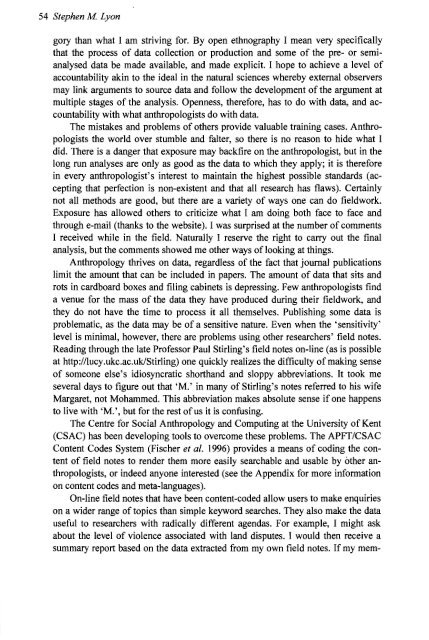JASO - Institute of Social and Cultural Anthropology - University of ...
JASO - Institute of Social and Cultural Anthropology - University of ...
JASO - Institute of Social and Cultural Anthropology - University of ...
Create successful ePaper yourself
Turn your PDF publications into a flip-book with our unique Google optimized e-Paper software.
54 Stephen M Lyon<br />
gory than what I am striving for. By open ethnography I mean very specifically<br />
that the process <strong>of</strong> data collection or production <strong>and</strong> some <strong>of</strong> the pre- or semianalysed<br />
data be made available, <strong>and</strong> made explicit. I hope to achieve a level <strong>of</strong><br />
accountability akin to the ideal in the natural sciences whereby external observers<br />
may link arguments to source data <strong>and</strong> follow the development <strong>of</strong> the argument at<br />
multiple stages <strong>of</strong> the analysis. Openness, therefore, has to do with data, <strong>and</strong> accountability<br />
with what anthropologists do with data.<br />
The mistakes <strong>and</strong> problems <strong>of</strong> others provide valuable training cases. Anthropologists<br />
the world over stumble <strong>and</strong> falter, so there is no reason to hide what I<br />
did. There is a danger that exposure may backfire on the anthropologist, but in the<br />
long run analyses are only as good as the data to which they apply; it is therefore<br />
in every anthropologist's interest to maintain the highest possible st<strong>and</strong>ards (accepting<br />
that perfection is non-existent <strong>and</strong> that all research has flaws). Certainly<br />
not all methods are good, but there are a variety <strong>of</strong> ways one can do fieldwork.<br />
Exposure has allowed others to criticize what I am doing both face to face <strong>and</strong><br />
through e-mail (thanks to the website). I was surprised at the number <strong>of</strong> comments<br />
I received while in the field. Naturally I reserve the right to carry out the final<br />
analysis, but the comments showed me other ways <strong>of</strong> looking at things.<br />
<strong>Anthropology</strong> thrives on data, regardless <strong>of</strong> the fact that journal publications<br />
limit the amount that can be included in papers. The amount <strong>of</strong> data that sits <strong>and</strong><br />
rots in cardboard boxes <strong>and</strong> filing cabinets is depressing. Few anthropologists find<br />
a venue for the mass <strong>of</strong> the data they have produced during their fieldwork, <strong>and</strong><br />
they do not have the time to process it all themselves. Publishing some data is<br />
problematic, as the data may be <strong>of</strong> a sensitive nature. Even when the 'sensitivity'<br />
level is minimal, however, there are problems using other researchers' field notes.<br />
Reading through the late Pr<strong>of</strong>essor Paul Stirling's field notes on-line (as is possible<br />
at http://lucy.ukc.ac.uklStirling) one quickly realizes the difficulty <strong>of</strong> making sense<br />
<strong>of</strong> someone else's idiosyncratic shorth<strong>and</strong> <strong>and</strong> sloppy abbreviations. It took me<br />
several days to figure out that 'M.' in many <strong>of</strong> Stirling's notes referred to his wife<br />
Margaret, not Mohammed. This abbreviation makes absolute sense if one happens<br />
to live with 'M.', but for the rest <strong>of</strong> us it is confusing.<br />
The Centre for <strong>Social</strong> <strong>Anthropology</strong> <strong>and</strong> Computing at the <strong>University</strong> <strong>of</strong> Kent<br />
(CSAC) has been developing tools to overcome these problems. The APFT/CSAC<br />
Content Codes System (Fisc her et al. 1996) provides a means <strong>of</strong> coding the content<br />
<strong>of</strong> field notes to render them more easily searchable <strong>and</strong> usable by other anthropologists,<br />
or indeed anyone interested (see the Appendix for more information<br />
on content codes <strong>and</strong> meta-Ianguages).<br />
On-line field notes that have been content-coded allow users to make enquiries<br />
on a wider range <strong>of</strong> topics than simple keyword searches. They also make the data<br />
useful to researchers with radically different agendas. For example, I might ask<br />
about the level <strong>of</strong> violence associated with l<strong>and</strong> disputes. I would then receive a<br />
summary report based on the data extracted from my own field notes. If my mem-

















